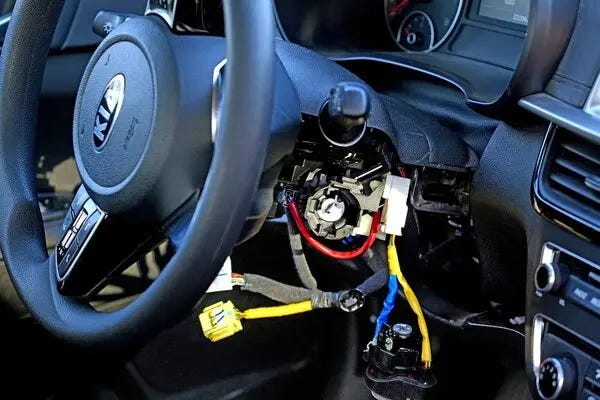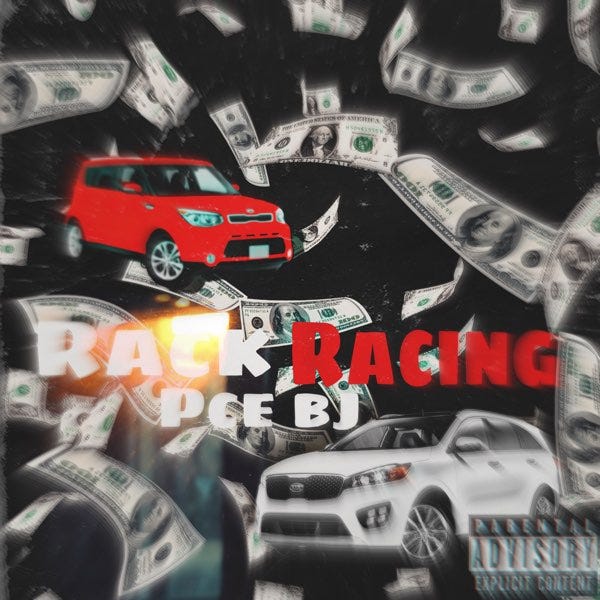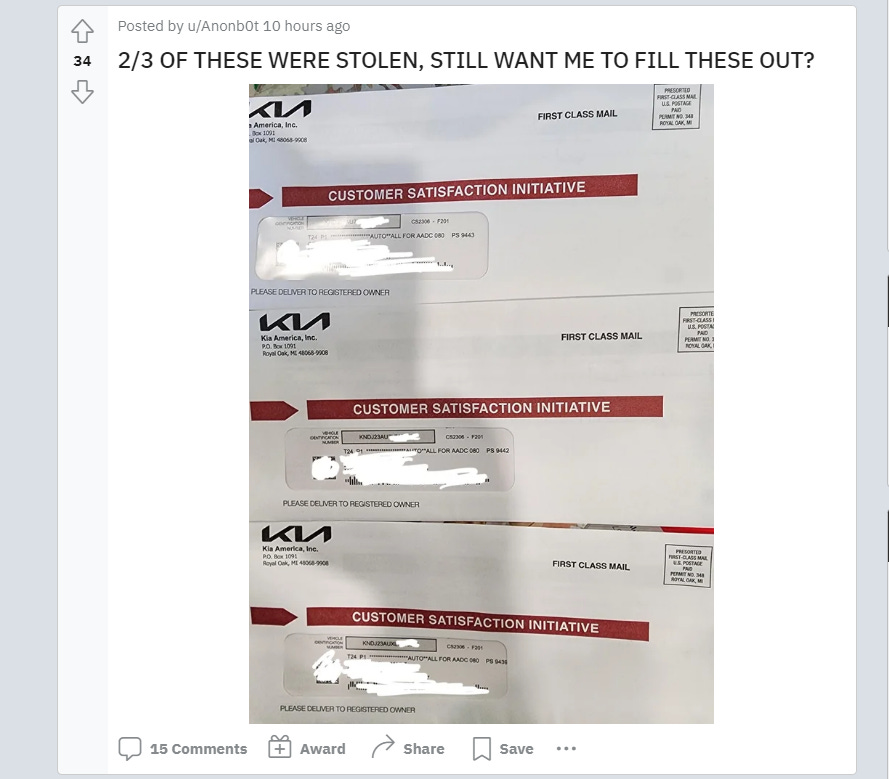A Soundtrack to My Car Theft
Milwaukee’s rap scene is on the rise. As the scene emerged, some young Milwaukeeans discovered a fatal flaw in cheap cars. The product? Kia Boys-themed hip-hop.
You’ve probably heard the story on your local news station: most Kia and Hyundai models sold in the United States in the 2010s have a weak spot. There are ample YouTube videos showing how you only need to bust the back passenger window, unscrew the steering column, and stick in a USB-A plug to get control of the ignition. Only about a quarter of Kia and Hyundai models sold during this time had engine immobilizers (smart tools that sense your key fob and shut the engine off if the ignition is turned without the fob in range), compared to nearly 100% of all other models sold in the States. These base model cars are entry level in the American car market, which is increasingly dominated by massive SUVs and pickup trucks that command $50,000 price tags. Chances are strong that your local news anchor has uttered the phrase “Kia Boys” with a shudder, suggesting that they’re an organized gang of 12- to 15-year-old kids sharing Bedlam’s trade secrets on TikTok. After an interview with the metro area’s police chief lamenting absent fathers or some shit, it’s back to the weather.
I had a Hyundai stolen this summer that way. In July 2021, I bought a used Hyundai Sonata when my previous car, a 2005 station wagon I bought from my aunt, died on my 25th birthday. It was the first car I ever bought in a dealership and the first car I ever financed. The market for used cars was awful; supply chain issues jacked up new car prices, sending more buyers into the used car market. If you needed wheels, you needed to act fast. I lived in Cleveland; I needed wheels. I can remember haggling with my salesman, a bright-eyed 21-year-old, over the down payment: I wanted to drop a larger one than he wanted me to; he wanted to lock me in a larger loan. In the end, I just needed wheels. We came to an agreement. Almost two years to the day after purchase, I found the space where I left my car empty, save for a pile of broken glass, and began the month-long process of recovering and evaluating the car to determine if I could keep it. After a month, my insurance’s appraiser deemed the car a total loss. The bill to fix it myself was well beyond something I take on. I’ve been lucky: many insurers are seeking technicalities to avoid payouts on these vehicles since there have been so many.
The Hyundai Sonata in Question
For at least a year now, I’ve had a vague awareness of the flaw and subsequent car thefts, but I didn’t have a great awareness of what to do about it. I understood that there were steering wheel locks out there for a couple hundred bucks a pop, but I felt incensed that I’d have to drop so much cash because of a manufacturing flaw. Police departments nationwide have gotten a handful of locks from the manufacturers to give out, but the events aren’t well publicized, nor do they even have that many locks to offer (100 per distinct in Philadelphia seems low). Unbeknownst to me, Hyundai dealerships offered software upgrades on qualifying models for free. Ultimately, the manufacturer’s efforts have been minimal, treated more like a PR fire than a consumer safety issue, and local safety regulators act much the same. There’s no sign of a recall of these vehicles because the regulating bodies claim they will only issue recalls for safety issues that arise from normal use — any safety issues that arrive from dangerous or unlawful activity is apparently none of their concern. It’s a great way to shrug it all off. After all, there are millions of these cars on the road. They’re entry-level models, realistically the only cars many people can buy new or gently used, especially in the era of wage stagnation.
Reporting on the “Kia Boys” phenomenon has mostly stayed in the purview of local news, the last people who I’d trust to talk about this issue with any nuance. On the basics, they’re more or less correct: most people stealing these cars are young and Black, often too young to be licensed, and many of them do find out how to steal the cars from social media. Usually, it’s just for a joyride until the car won’t run anymore (when you mess with the ignition like this, usually the battery doesn’t last much longer). More concerning is that many are crashed and totaled, sometimes resulting in injury or death. But the “Kia Boys” are hardly a “gang” like many media are calling them; any time a cop or news anchor suggests as much should be treated as inflammatory. Disregard that. Realistically, the Kia Boys’ nonsense is a standard “performance crime,” something done to draw attention, and they’ve been a part of human life for as long as there’s been crime. The fact that we can perform for each other this easily online is new and concerning, but it’s not an entirely new phenomenon.
Busted steering column
What should be the most interesting is where it’s happening the most. While it’s happening all over the country, much of the reporting I find is from Milwaukee (the city where the trend traces back to), Cleveland, Minneapolis, Seattle, Philadelphia, Columbus. While American cities have a time-honored tradition of racial segregation, still enforced by the police under pretext, northern and western post-industrial cities have it real bad. There’s evidence to suggest that segregation is more persistent in northern cities. The outsized role that cities like Chicago, San Francisco, Cleveland, and Philadelphia had in the Civil Rights and Black Power movements, and their outsized backlash, reinforce time and time again that white supremacy and Black oppression are inherent components of the American state. In the 21st century, white supremacy in these cities looks like escalating police militarization, urban gentrification, public school defunding, welfare reform, mass incarceration, financial exclusion, persistent homelessness…you get the gist. It feels like an awful coincidence that the Kia & Hyundai flaw was discovered and popularized in Milwaukee first, a heavily segregated city in the upper Midwest that also served as the setting for Matthew Desmond’s book Evicted, a contemporary must for bleeding-heart liberals. It’s a good read, demonstrating the excessive, reverberating violence that comes with tenant eviction and its particularly pernicious effects on Black households in segregated cities. It’s a bit lax on some landlords, arguably, but it does a good job showing the contemporary nexus of owners, managers, officials, renters, etc who characterize the modern rental economy. It’s a multi-actor extractive process, with tenants squarely at the bottom.
Milwaukee also happens to be one of the most exciting cities for underground hip-hop seen in years. For Pitchfork, Alphonse Pierre has kept up with the Milwaukee scene for a while, documenting its unique maximalism, DIY festivities, and growing stars. Rising favorites like Lakeyah, Certified Trapper, Bigfrank414, AyooLii, and more have helped solidify a sound and ecosystem distinct to the Great Lakes city. Local labels, promoters, comedians, videographers, podcasters, and more have played a huge role in creating a whole apparatus through which the scene can ascend. It reminds me of all the players in Cleveland’s growing rap scene, itself another focal point of avant-garde DIY hip-hop. In these northern cities, where Black communities have been under distinct siege and surveillance from white leaders and police for decades, DIY is the way of life. Exclusion from the formal economy, resource extraction, and 24-hour full-frontal assault from an increasingly angry police state do, literally, keep communities down. That includes artistic communities and youth.
In places like Milwaukee, Cleveland, or Philadelphia, where segregation leads to isolation and surveillance, it’s abundantly clear that the prevailing norms that inform the mainstream power structures are bogus at best, evil at worst. It’s in situations like these, where people recognize and respond to their oppression, that communities form their own norms. If society’s stacked against you, why not steal that car anyway? They made it so easy. In what I would still consider a highly problematic clickbait documentary, YouTuber Tommy G chats with a couple of “Kia Boys” about the appeal of stealing them: it’s good fun that wins them approval from peers. It’s kind of an excellent “fuck you,” a way to take control for a moment from a society that’s hell-bent on extracting resources out of you and dispose of you to keep the racial, spatial, capitalistic order stable.
Widely shared still from the “documentary”
Couple that with a pandemic that shuttered the local schools, already cash-strapped, sending young people back home to endure trauma. COVID-19 tore through Black communities quickly, largely because Black households were likely to have “essential workers” in the household. In the States, these workers ranged from medical staff to line cooks to transit operators and beyond. Most of these workers were forced to work with limited protection from the virus and no ability to take time off should they get sick without serious financial consequences. This hyper-exposure crossed with health challenges that often arise from the minority stress and poverty made COVID-19 extra deadly in Black communities. The kids that were forced to stay home, too often without sufficient resources to stay engaged in education, sought alternative modes of entertainment and community-building. The greater society wasn’t offering anything.
The YouTube documentary also shows what the local news won’t: most Kias and Hyundais are stolen locally. The aforementioned documentary features a quick conversation with a woman whose car had been stolen, so she was driving a much older Nissan with significant body damage. It was her next best option in a city where she needs a car to take care of her needs. As is typical, most crime in the city is crime of opportunity; people steal from their neighbors, and in these abused neighborhoods, people whose cars are stolen are left with few resources for recovery. In YouTube comment threads, tweets, and on any social media, you can find stories of low-income seniors, single parents, and first-time car buyers opting for these models and being financially stranded when they’re stolen. This is just as true in Philadelphia, where everyone is packed near each other, and Black neighborhoods in West Philadelphia were routinely abused and cleared in the latter half of the 20th century so the universities, and their students, could sprawl. But, of course, the local media gets its best ratings when stoking fear in the majority-white suburbs, unsubtly convincing a quietly prejudiced public that Black citydwellers are coming to steal their hard-earned property for perverse reasons. That’s not what’s happening. I don’t see much of any media out there trying to understand this phenomenon beyond that dangerous fiction.
Also emerging from the Milwaukee rap scene are viral tracks featuring the occasional verse or album cover sporting Kias. “If I see a Kia then I’m taking your shit,” starts an especially catchy hit from young rappers Marry Mac and Shawn P, a guaranteed find on any Kia Boys-themed user-generated Spotify playlist (I like this one). There’s Pce Bj’s 2021 album Rack Racing, featuring the hit “Kia/Hyundai Boy Anthem.” Interspersed in these playlists, which have modest but sizable followings, are hits from Milwaukee’s biggest players, few of which actually touch the actual Kia/Hyundai nonsense, but whose beats are endemic to this burgeoning scene, copycatted and deep fried by young hands. Rappers are going to rap about what’s going on; Kia and Hyundai imagery is a new set of signifiers showing a distinct kind of youth culture. While youth culture is often misrepresented to unlock conservative impulses in cautious parents, the things that Black youth do are especially pathologized. White kids in the suburbs cause all kinds of havoc, but what they do, what images they share, what music they make, etc. don’t tend to result in carceral moral panics. There’s no doubt that joyriding in a damaged car is dangerous — and there’ve been lots of crashes and some deaths associated with Kia Boys type thefts — but instituting a moral panic across the country about Black families will only exacerbate both the underlying problems and their current manifestation.
Kind of obsessed with this cover
With all the talk about Kia and Hyundai thefts, there are questions about how to stop it. The Kia Boys documentary seems to suggest that harsh prison sentences are the way to go; I profoundly disagree. Incarceration doesn’t work. It’s rooted in white supremacist tactics of gaining and enforcing domination and extraction.. I can’t really imagine any other way these thefts will go down other than these cars ceasing to be aroun City after city is suing the South Korean conglomerate that manufactures these cars, citing the extra resources they’ve needed to deal with the car thefts. Chicago’s suit calls out how Kia and Hyundai thefts have exposed primarily working class motorists to financial ruind. The companies involved seem unmotivated to connect with car owners about upgrades to which they’re entitled. The makings of young people exploiting these manufacturing deficits goes back centuries. Unless Washington is planning to execute the massive wealth transfer owed to Black Americans, close the prisons, and restore public facilities in Black neighborhoods, I can’t comprehend why any Kia Boy would stop. News anchors will claim these Kia Boys run the streets, and unaffiliated neighbors have every right to be worried, but when it comes to the real levers of power, the Kia Boys are on the losing end, and that’s by design. It’s only really worth it to go after the companies who cut corners. They’re the ones who hold power and they’re the ones who are, at this point, getting away with but the most meager cuts to their bottom line.
In my ideal world, car ownership isn’t a necessity, or even all that desirable. I can get around without a car in Philadelphia pretty well, but sometimes, it’s necessary. I can’t imagine trying to commute to the suburban office parks that more firms are choosing without a car. I couldn’t move without a vehicle, so I rented cargo vans from U-Haul. Not all of Philadelphia is easily connected via transit, so my daily life has shrunk. My family is still in Cleveland, a city that’s even harder to get around without a car. Ever since Urban Renewal, we’ve been living in cities where private automobile use is subsidized with cheap roadways and free parking. Transit has suffered and curtailed its offerings. As long as car dependency is a reality in most American cities, vehicle thefts will be more than just an inconvenience; they’ll be emotionally charged and generate economic precarity. In a few weeks’ time, you might see me driving a cheaper car; I’m a graduate student, I’m not sure if I can afford a car of the same quality as I could when I was working full-time, full year. I’d love to wait a year to buy again, but I’m not sure. And, if you couldn’t tell, the whole theft thing has been on my mind a lot. I took a risk by going back to school, accepting some financial precarity with the hope that it pays off down the road. It doesn’t feel good. And I know it’s been happening to my friends, too; it feels especially weird to be at this early point in our adult lives, driving our first practical cars we bought ourselves, and get let down by a multibillion dollar conglomerate. It’s the kind of shit that makes you want to throw in the towel.
The best rap scenes aren’t just the ones with the more variegated social infrastructure designed to promote the scene, although that’s absolutely necessary for any music scene. Innovative rap scenes keep up with the times and highlight subjects that are relevant. To the racist, alarmist media, Kia Boys rap is another sign of degeneracy. In reality, it’s a sign that young people are making, sharing, and consuming music with imagery that’s relevant to them in that moment. It’s a way to traffic in a shared lexicon. Everyone who’s listening is in on it. Naturally, it’s going to happen alongside everything else that’s happening in the city’s rap scene. I’m not a seasoned rap critic, so take this with a grain of salt, but I doubt that the Kia Boys-themed music is going to have the same staying power as other boundary-pushing rap coming out of Milwaukee. But, it’s wild to see the music of up-and-coming hitmakers like Certified Trapper on these Kia-themed playlists. That Milwaukee would be an epicenter of experimental rap and experimental car theft is a sign that it’s a city where people are actively seeking out innovative, perhaps even daring ways of expressing themselves.
The salesman who sold me my Hyundai called me the day after mine was stolen to wish me a happy birthday. I told him never to call me again.








